New Horizons and Challenges in Communication for Social Change in Zambia by Ailish Byrne
Photos by Ailish Byrne
"We just want to show our appreciation for the participatory monitoring and evaluation workshop we had with you last month here in Kabwe, Zambia. It really impacted so much on our work with the CFSC project that it is now much easier "¶ to carry out its activities. The last day with you was so exciting and significant because, by the time the workshop closed, many things "¶ had been explained."Ě
Participant in May 2006 workshop
In May 2006, 20 youth facilitators and peer educators from Kabwe and Kapiri involved in HIV/AIDS prevention initiatives met in Kabwe, the provincial capital of the Central Region of Zambia. They joined three staff members from UNICEF Zambia for a three-day workshop on CFSC as well as participatory monitoring and evaluation (PM&E). The Consortium's Ailish Byrne and Denise Gray-Felder facilitated the workshop.
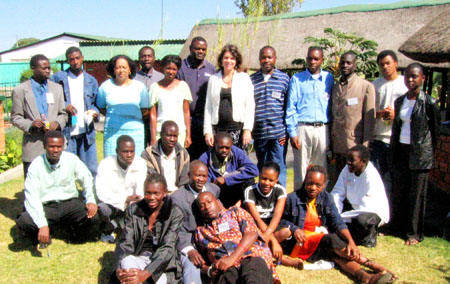
Facilitators and participants of the Kabwe CFSC Workshop.
Photo by Afework Ayele.
The Kabwe workshop gave participants an opportunity to: 1) Share and critique their communication experience so far; 2) Learn more about CFSC approaches and PM&E in particular; 3) Strengthen alliances; and 4) Use this learning to plan for the future, as part of a broader ongoing capacity development process.
The 20 leaders represented four bodies engaged in local and national HIV/AIDS communication activities:
- Network of Zambian People Living with HIV and AIDS (NZP+);
- Student Partnership Worldwide (SPW);
- Youth Friendly Health Services (YFHS); and
- The District AIDS Task Force (DATIF).
The Network of Zambian People Living with HIV and AIDS is a community-based membership organization of support groups that provides peer education.
Student Partnership Worldwide trains and supports peer educators and starts dialogues in schools and other places where youth gather.
Both organisations have been extensively involved in CFSC-related activities but, before the May workshop, had received minimal training or support with CFSC from the outside.
UNICEF Zambia selected these organisations to be key players in its CFSC project because of their ability to spark community dialogues and reach youth throughout the district and beyond.
As elsewhere in Africa, mass education HIV/AIDS-prevention campaigns aimed at changing individual behaviour, in place for more than two decades, have not had the desired effect. Many youth feel imposed upon, rather than involved in, HIV/AIDS related activities supposedly planned "for them."Ě
Such scenarios have fuelled interest in broader, more locally owned, and community-oriented approaches"Ēsuch as communication for social change (CFSC)"Ēgeared towards changing social and community norms.
CFSC-Initiatives
Since 2003, the Consortium has supported UNICEF Zambia to strengthen CFSC-related initiatives. This has involved intensive in-situ training and facilitation at periodic workshops, along with active follow-up and support for key players in between such events. Workshops are just one step in an ongoing CFSC capacity development process.
Programme objectives are: 1) Increase the number of young people district-wide, 15 - 25 years old, who know their health status vis-ŗ†-vis HIV/AIDS; and 2) Help create social conditions where testing for HIV/AIDS is easy and viewed as desirable, leading ultimately to more community and government support for HIV-positive people.
These objectives match those of the Zambian government's priorities as well as the Millennium Development Goal No. 6.
The initiatives emphasise the stimulation and support of youth-to-youth dialogue that leads to youth-to-adult dialogue within communities. Such dialogues help communities demand and secure their rights. The media, government, non-governmental organisations, community-based organisations and others are all important players.
Why Kabwe and Kapiri?
UNICEF Zambia has selected Kabwe and Kapiri as pilot districts for their CFSC programme for two main reasons; 1) There are widespread, strong local support groups and peer education schemes in Kabwe and Kapiri and 2) The people of Kabwe and Kapiri districts face considerable risk of contracting HIV/AIDS.
Kabwe, Zambia's second largest city, lies on a major transit route for buses and trucks travelling between the Copperbelt, Luapula and Northern provinces, Lusaka and elsewhere.
The closure of mines and the sale of Zambia Railways has resulted in close to 68 percent youth unemployment. Kabwe's 15 health centres are in urban areas despite a predominantly rural population
Kapiri, a small village at the crossroads of Africa, lies close to the Tazara railway and the Copperbelt. There are only three voluntary counselling and testing centres in Kapiri, leaving isolated rural populations (the majority) largely unserved.
The Context: Voluntary Counselling and Testing (VCT) Poses Challenges
Previous CFSC events in Lusaka, Zambia's capital city, highlighted challenges people face in securing access to, and using, voluntary counselling and testing (VCT). The challenges included stigma, inappropriate training of counsellors and ineffective government policy. In addition, people generally consider testing to be too expensive, too much of a hassle and, most important, too far away and inaccessible. Understandably, people are unable to walk 20 km to receive test results.
In general, knowledge about HIV/AIDS is adequate, so inaccessibility remains the major obstacle to VCT, along with distrust of counsellors and fears about confidentiality. Although the policy of free antiretroviral drugs has fuelled some optimism, indirect costs (time, transport) linked to the limited availability of service providers and drugs remain major obstacles to testing and treatment.
What Has Happened to Date?
In 2004 UNICEF brought key stakeholders together at several events to consider the potential and value of CFSC approaches in this context. Subsequent meetings have established enhanced understanding of, and support for, CFSC among key players.
In 2005, UNICEF began introductory workshops with youth organizations active in Kabwe and Kapiri. In August 2005, building on previous work, UNICEF shared the CFSC concept with its two main two partners: The Network of Zambian People Living with HIV and AIDS and Student Partnership Worldwide.
In November 2005, UNICEF invited other district-level organizations to participate in CFSC activities to create synergy among different groups working in this field and so that these other groups also might learn about CFSC.
Participants included youth representatives, community and development workers, nurses, teachers, clinical officers, NGO leaders, government staff, chief representatives and the media.
At previous CFSC workshops, youth have highlighted the important roles they feel youth should play:
- Sensitising their communities to challenges they face (including HIV and AIDS), through dialogues, drama, poems, cultural dancing and sports;
- Demanding accessible voluntary counselling and testing services;
- Lobbying for action and improved services; and
- Forming "youth-friendly corners."Ě
"Youth friendly Corners,"Ě a Ministry of Health/UNICEF-supported project, provides a room at health centres where volunteer youth, who have received basic training as counsellors, are the first point of contact and serve as peer educators for fellow youth and others. The volunteers do initial screening before referring them to clinic staff for treatment.
The young people who come to these "youth-friendly corners"Ě typically feel marginalized and unsupported by their communities. They face such challenges as unemployment and related socio-economic problems, marriage at young ages and child abuse.
Space to Reflect and Learn
The Kabwe workshop provided a forum to share, reflect critically and discuss CFSC experiences and challenges. Participants consolidated and deepened their understanding of CFSC. They considered practical ways CFSC processes might best be evaluated.
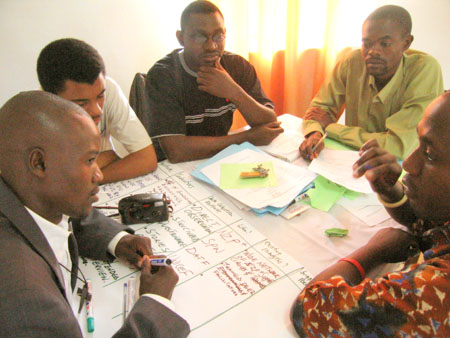
The workshop in progress.
The workshop process, highly participatory and intentionally flexible, itself mirrored CFSC fundamentals of participation, voice, creating space and strengthening alliances. It drew extensively on participant experience throughout and remained responsive to emerging process, concerns and priorities, a style much appreciated, as indicated by the following participant comments:
"I liked the participants and the participation with them. It's one of the workshops where I witnessed all participants participating."Ě
"It has brought us together as one and more and more ideas have come out from people and facilitators. It has opened up my mind in how to go about participatory monitoring and evaluation."Ě
"Thank you very much for empowering us, we hope more such workshops are organised in future for more empowerment of the youths."Ě
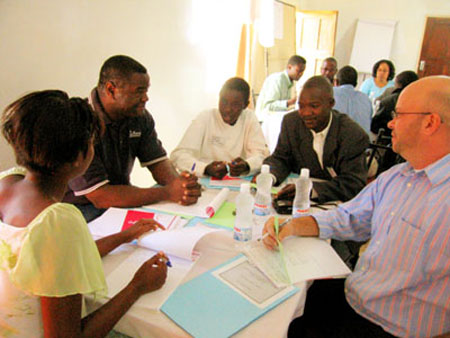
Participants share their experiences with CFSC.
By sharing their experiences, participants highlighted the benefits of their earlier exposure to CFSC, including:
- More equal, less hierarchical working relationships with different partners;
- Strengthened professional relationships
- Greater understanding of beneficiaries' lives; and
- Increased knowledge and use of participatory approaches in organizations, including of participatory research techniques.
The participants also documented their ongoing challenges, including:
- Insecure funding that hinders planning, sustainability and dampens morale;
- Inadequate basic resources as is typical to poor rural locations. In particular transport, computer and Internet facilities;
- Difficulties reaching the neediest people;
- Inflexible organisational cultures and structures;
- Lack of incentives to fuel motivation and progress;
- Heavy current workloads;
- Fears and problems that cause people to shun voluntary counselling and testing, discussed above; and
- Need for training in facilitation, mediation, counselling, monitoring and evaluation.
As everywhere, levels of commitment vary and, in the "aid culture"Ě that permeates Zambia today, there is a strong expectation of incentives to maintain commitment and motivation.
Previous workshops illustrated widespread enthusiasm towards CFSC, with participants eager to learn more. However, to date, success has been limited in establishing effective, mutually supportive partnerships between key players and in forming lead, coordinating networks.
Anecdotal evidence suggests some notable achievements, but it remains too early in the life of the project to assess the impact of CFSC on increased uptake of voluntary counselling and testing.
Evaluating Communication for Social Change
"The participatory monitoring and evaluation strategy was most important because it has enabled me to know how to involve youths in evaluation."Ě
-- Participant in May 2006 workshop
Understanding fundamental concepts is key to any evaluation. The workshop participants considered such questions as: What do we really need to know to enhance our HIV/AIDS communication practice and impact? Why is particular information needed and for whom it is important? How might we collect necessary information? What are the implications of resources and support? How do we assure quality throughout the process?
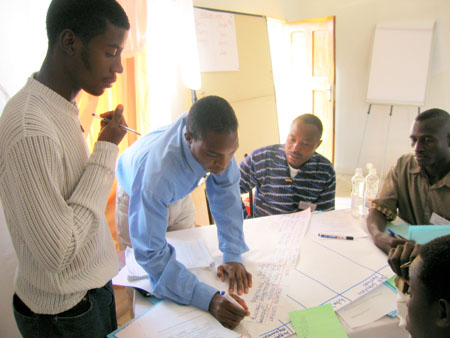
Workshop participants discussing key questions.
Following this discussion, the participants were challenged to consider how they might capture what they themselves and their intended beneficiaries consider to be the most important changes in a programme. This served to introduce the Most Significant Change (MSC) approach, which was later complemented by a session on developing indicators in participatory ways. Focused work on these exercises was intended to complement other dominant and more familiar ways of evaluation.
An exercise in sharing personal stories of change was used to engage participants in some of the deeper, more complex questions underlying the challenge of effectively hearing, capturing, documenting and sharing the impact of what we do, i.e., of effective monitoring and evaluation.
Based on their earlier preparation, in small groups participants told a brief story based on such questions as: What do you think or feel was the most important change that took place in your HIV and AIDS communication work? What do you think or feel was the most important difference made to the people you work with in the past 6-12 months? Why do you think or feel this change is/was important? Why do you think this change is happening/happened?
The participants shared and discussed their stories in structured group work, inspiring deeper reflection and thought about the content and process of story-telling and listening.
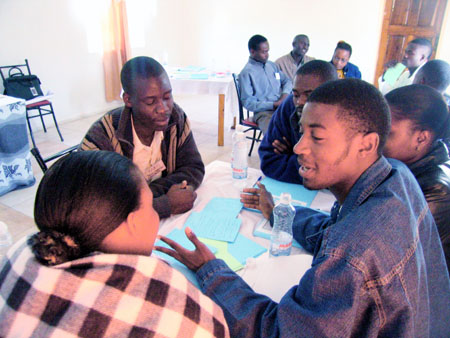
Telling stories and listening.
By analysing the rich content and process experienced in the exercise, participants were introduced to the potential of stories of change for evaluation purposes. The connection between a fieldworker's roles as listener and evaluator was highlighted, as were the challenges and importance of effective, active listening.
The Most Significant Change (MSC) Approach
The exercise above was taken further by introducing the Most Significant Change (MSC) approach to evaluation and its value to CFSC initiatives.
The group listened to two in-depth stories of changes over time resulting from HIV/AIDS communication experiences elsewhere in Africa, before the facilitator guided discussion and comparison of them. Participants drew out the key themes and essence of particular stories, and each participant selected the story he or she considered most significant and identified why.
Throughout the process facilitators prompted participants to consider the following: What makes an experience or story "significant"Ě or "important?"Ě Why? According to whom? What is the relevance of this to your work? What makes some stories better or richer than others? What factors impact on such judgments?
In short, participants were encouraged to engage with complexities fundamental to any evaluation, in a real and applied context. Reflecting on the entire process, they considered what makes a story legitimate, representative, valuable for its uniqueness, or otherwise.
Many participants were struck by the depth of usually missed, but valuable detail that can come from just one in-depth story or Most Significant Change interview. For example:
"From one story you can get a lot of detail; it is a very useful monitoring and evaluation tool."Ě
"Now I know that you can get a lot of information from a story that could have been difficult and sometimes not forthcoming in statistics."Ě
"I've gained greater insights into participatory monitoring and evaluation which is definitely more useful than the orthodox monitoring and evaluation we're accustomed to. My mind has opened up to view new horizons which will be very useful in my community work."Ě
Developing Indicators in Participatory Ways
Building on the above, facilitators at the Kabwe workshop challenged and guided participants to develop indicators"Ēsigns"Ēof progress to subsequently try out in their work environments. The participants worked through steps entailed in the process of identifying/developing appropriate indicators, collecting and using the data and ensuring rigor through the process.
Later, group presentations inspired further discussion about issues of relevance (to whom?), validity, quality versus quantity, resource-intensiveness/feasibility, capacity development needs and, importantly, which indicators would be more or less relevant to diverse development actors.
The workshop provided participants with the time and guidance necessary to consider such questions in a safe environment. The discussions proved taxing but were highly rewarding, as reflected in many comments, such as:
"I loved the session on objectives and identifying indicators. It was quite challenging but very helpful in that we will easily identify indicators from here onwards."Ě
"Everyone, especially myself, was challenged and some sessions were exhausting."Ě
Participants also appreciated time spent on how to effectively document CFSC processes and achievements in participatory ways, with emphasis placed on: 1) Being community based"Ēmeaningful to, and prioritising of accountability to, the community; and 2) Being a foundation for communication and transparency.
Reflecting on Group Process
In participatory workshops, the process of engagement often yields deeper learning, challenges and memorable moments, than does the content of the workshop. The experience can fuel rich individual and group reflection and learning.
Given the focus of the Kabwe workshop, the facilitators decided to devote time to reflecting on personal experiences of process over the three days.
They created a space safe enough to engage with sensitive issues arising during the workshop and, more widely, issues that continue to challenge the "partnership"Ě between key players.
Although initially uncomfortable to some, this period of reflection proved to be one of the richest learning sessions, the honesty and productiveness of which testified to how far the group had travelled over the course of three days:
"All the sessions were wonderfully conducted in a participatory way. I particularly liked the session where we analysed why certain participants dominate, and others choose to keep quiet."Ě
"Group work helped me to reflect and have deeper thinking in trying to answer or do the tasks assigned."Ě
Participants were guided to reflect honestly on their experience in different groups; to consider whether as individuals and groups they had facilitated inclusion and equity; and how they might have inadvertently limited the meaningful participation of particular individuals.
This fuelled much discussion about the strengths, weaknesses and roles of dominant voices/leaders/strong opinions ("made people think more effectively,"Ě "generated a sense of mission,"Ě "assumed leadership"Ě), of quiet voices ("listened to create a feeling of harmony"Ě), the younger/the less experienced/the less literate ("tended to be pushed down or quieted"Ě).
Facilitators challenged participants to consider ways of dealing constructively with differentials of power and voice, with conflict and tension, with confusion, different understandings and experience. Participants discussed what makes for strong or weak groups, and their own related roles and responsibilities.
The importance of active listening, of spontaneity and expressing passion, of diversity ("adds flavour and stimulates dialogue"Ě), inclusion, collective responsibility, challenging stubborn or dominant individuals, expressing individual views and reaffirming quieter or shyer participants, emerged from the rich discussion.
The groups considered strategies for leading groups effectively and for getting things done. Participants noted the relevance of learning about group dynamics and group management strategies to their own roles as facilitators.
This developed into a productive discussion on the meaning of "partnership"Ě and a deeper understanding of the challenges it presents. There was agreement that partnership involves collaboration; that all partners have a role to play and all have responsibilities; and that sharing, networking and "working hand in hand"Ě are important.
Honest sharing and reflection on their experience of partnerships fuelled discussion about major challenges including very diverse expectations and understandings of what partnership entails, of what different partners are expected or assumed to contribute and achieve, and of questionable assumptions that leave some feeling misled.
Lack of clarification about available funding, organizational inflexibility and delays in providing promised funding for basics such as notebooks and particular activities such as transport in rural areas, have had a detrimental impact on partnerships in this project to date.
Moving Forward
Looking to the future, participants agreed on the importance of clarifying and ensuring understanding among all partners, up front, of factors that influence partnership"Ēincluding expectations, assumptions, available resources and support, roles and responsibilities, honesty and effective communication.
Participants emphasized the importance of follow-up and setting achievable goals, stronger collaboration, forming district networks to ensure coordination, cooperation and avoid duplication; and getting more youth involved in similar processes.
There was much interest in strengthening organizational and individual capacity in CFSC and participatory monitoring and evaluation (PM&E), including ensuring deeper understanding of the concept of being a facilitator.
The workshop finished with better-informed planning for CFSC and participatory monitoring and evaluation, in the short and long term. Participants considered how they can immediately make use of learning, what resources and strengths currently exist and what extra support they will require.
Commitments made by different participants and organisations included:
- Briefing their partners and training facilitators in PM&E;
- Developing and revisiting work and action plans;
- Documenting all work;
- Collecting stories of change from communities;
- Ensuring the provision of basic supplies for documentation; and
- Starting and strengthening dialogues with youth.
Ideas on a longer-term (two-year) vision included:
- Spreading CFSC and PM&E training country-wide;
- Sourcing funding to expand youth friendly corners;
- Creating new venues and activities for communication;
- Consciously developing PM&E capacity and skills;
- Creating a community radio station to meet the needs of local communities; and
- Advocating for the integration of CFSC approaches into local school curricula.
There was firm agreement on the need to better document and share information and best practices emanating from the two pilot CFSC districts, such that these communities become role models for Zambia.
The Workshop as an Evaluative Experience
Through their exposure to participatory monitoring and evaluation (PM&E) processes, participants appreciated PM&E's:
- Relevance to their own work and, in particular, its strength in being grounded in values that inform their work;
- Being practical and of interest to communities concerned;
- Being action-oriented and helping to ensure that the programme actually benefits intended beneficiaries; and
- Ability to stimulate positive change, inform future planning through collaborative analysis and learning, and imply commitment to real change.
As one participant commented, "It was useful because it has enabled me to know how to interact and dialogue with the community."Ě
Another participant noted that monitoring and evaluation is often seen as a formal requirement, but that the workshop as a whole strove to understand what makes for a good evaluation.
The workshop certainly testified to the value of time and space to reflect and learn. As evaluation guru M.Q. Patton states:
"'Process use' refers to using evaluation logic and processes to help people in programs and organizations learn to think evaluatively"¶ . Learning how to think evaluatively is learning how to learn"¶ . It is an experience that the leadership in organizations is coming to value because the capacity to engage in evaluative thinking has more enduring value than a delimited set of findings, especially for organizations interested in ongoing learning and improvement "¶ . Specific findings typically have a small window of relevance. In contrast, learning to think and act evaluatively can have ongoing impact"Ě.
We look forward to continuing our support for those engaged in CFSC initiatives in Zambia, to learning more from each other and to strengthening and effectively capturing impact.
Thanks to all participants in the May 2006 workshop and to James Simasiku, Maimuna Ginwalla and Glenn Shaw of UNICEF Zambia for their help organizing and documenting the workshop.
References
BBC News online (22 June 2006). Zambian HIV couple confront Aids crisis. Featuring a workshop participant and leader of a local NGO. See: http://news.bbc.co.uk/1/hi/business/5094684.stm
Byrne, Ailish with Gray-Felder, D, Hunt, J & Parks, W (Eds.) (2005). Measuring Change: A Guide to Participatory Monitoring and Evaluation of Communication for Social Change. New Jersey: CFSC Consortium. http://www.communicationforsocialchange.org/pdf/measuring_change.pdf
Byrne, Ailish, Gray-Felder, Denise and Hunt, James (Eds.) (2005). Communities Measure Change. A Reference Guide to Monitoring Communication for Social Change. New Jersey: CFSC Consortium. http://www.communicationforsocialchange.org/pdf/communities_measure_change.pdf
Davies, Rick & Dart, Jessica (2005). The "ėMost Significant Change' (MSC) Technique. A Guide to its Use. Version 1 "ď April 2005. http://www.mande.co.uk/docs/MSCGuide.pdf (accessed August 2006).
ISNAR/IDRC/CIA (2003). Evaluating Capacity Development. Experiences from Research and Development Organizations around the World. Foreword by Michael Quinn Patton. http://www.idrc.ca/openebooks/111-6/ (accessed August 2006).
Parks, Will with Gray-Felder, D, Hunt, J & Byrne, A (2005). Who Measures Change? An Introduction to Participatory Monitoring and Evaluation of Communication for Social Change. New Jersey: CFSC Consortium. http://www.communicationforsocialchange.org/pdf/who_measures_change.pdf
UNICEF Zambia (2005/6). Unpublished reports on CFSC workshops and activities. Thanks especially to James Simasiku.


